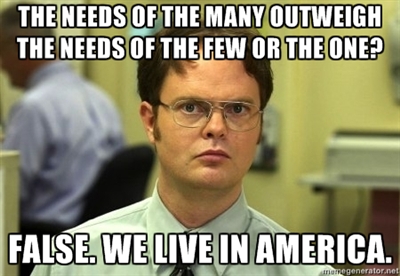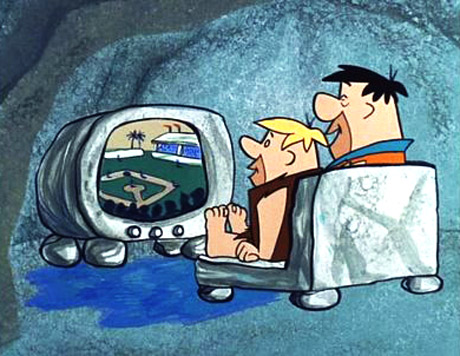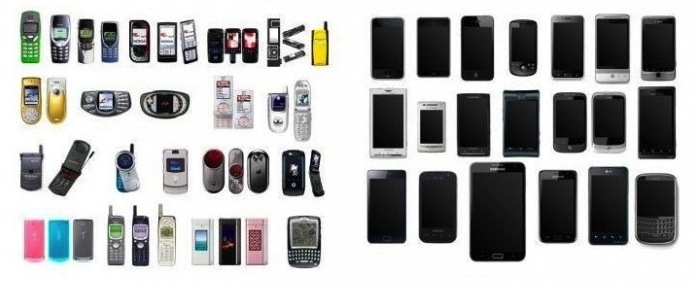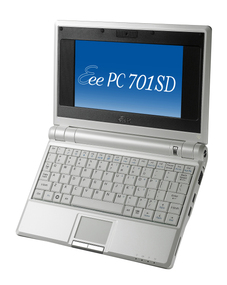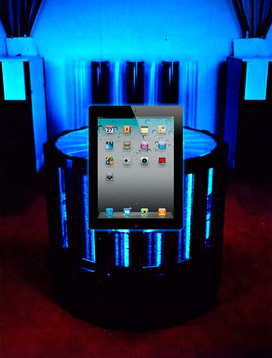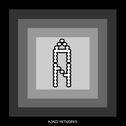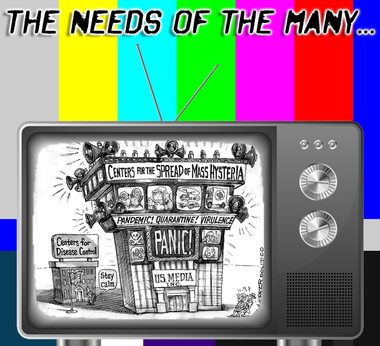
That clunker sitting on top or under your desk is known as a clunker because nobody seems to want to travel the world with something larger than what fits into your pocket. PCs (even laptops) are almost six feet deep, but not until mobile devices can do every single task your PC is capable of doing and twice as good. The prosumer market is not even close to dropping these dinosaurs. That's how they make their living! True, there are some journalists reporting exclusively from their smartphones but that's only because that specific need is being fulfilled.
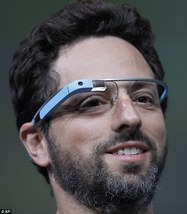
A great Vulcan once said, "The needs of the many outweigh the needs of the few or the one." Nothing could be truer in the technology consumer market. These needs fuel change and at a fast pace. The mobile revolution has evolved faster than any other consumer product, ever.
How many times do you need to revolutionize a microwave? What about your washer or dryer? Cars have come a long way but until they start driving themselves, there truly won’t be a revolution in personal transportation. Our personal lives and information are the precious items that are soon to be revolutionized. This is where wearable technology hopes to make waves. But for now, we have a screen that is a window into our personal data, entertainment, and livelihoods.
TV is only a result of this technology revolution. For years, the television has sat staring back at you and you at it. Manufacturers are now beginning to realize that TVs are pretty dumb. The smart TV is a reason for consumers to slowly begin using their TV in the way they use their smart, mobile devices. Apple is rumored to be influencing (revolutionizing) the TV in the way they have with other technologies, which I'll get into a little bit later.
Paying attention to a dinosaur is difficult when it doesn't offer you what you've come to expect from this brand new smart-world and this is one of the many reasons news stations in some aspects are crying for your attention.
Did you know that Television vs the Internet is the biggest thing on television since you had no idea it even was on the television? What I mean to say is, as a whole, television is constantly fighting to find new ways to best the Internet. Keep in mind, the Internet is everywhere and that’s the hidden key to all of this. The Internet has found a way to reach all aspects of our lives and “live” on almost all of our devices.
The next time you hear about a major hurricane or blizzard that is about to blow through, take a deep breath and remember that you are your own survivor. The community around you is designed to assist you in more ways that you may think. There is nothing wrong with being prepared and being sensible when it comes time to evacuate in the face of real danger, but when you find yourself running to the store to buy as many eggs, bread, and milk as possible at the drop of a hat, think about what you are actually doing. Heck, you can check that smart device you are carrying in your pocket and look at the raw weather data. Wikipedia and many other reputable sources online have great instructions on how to read weather instruments. Barometer? Anemometer? Radar?
Here is the problem that I have with impending disasters. I am in no way mocking real devastation. I’m simply reacting to the over-hyping of even the thought of an asteroid passing earth. An audience left gripping their seats as a commercial break takes place isn't fair...especially when they've just heard that their lives are in danger. I personally take issue with the way news broadcasts are being phrased and spun. I could say, “Scientists have discovered an asteroid that might hit the Earth in thirty years.” Or “Scientists have discovered an asteroid that is likely to pass near Earth in thirty years.” Which one is grammatically correct? They're both correct, however, the latter phrased in a way that sounds less exciting.
Hold on to your tomatoes, I’m going to be controversial by saying if you are still paying for all three, you are stuck in a very conditioned consumer rut. Who has the time for all three? Oops. I forgot. Some of you (if not all of you) are paying for a cell phone with a talk, text, and Internet (3G/4G) plan. That’s not to mention the cost of the phone with a two year contract! Take a moment to add this all up (remember to include your $7.99 monthly subscription for Netflix). Chances are, you’re in the thousands, including the cost for the hardware.
We all want to have a good time with our “things”, but when do we stop excessively paying out-the-ass for this stuff? The rut that I just described is rooted in habit and sly marketing. We don’t need all of these things, but the communications industry tends to make these kinds of decisions for us. So why do we still need TV? It’s a dinosaur as I’ve claimed, right? From where did cable TV originate and why is it still relevant in our lives?
Cable TV started as an experiment in Wilkes-Barre, PA in the 1972. HBO was served to 365 customers of Service Electric Cable. The experiment surely paid off and other companies adopted a model that has been working for decades. My non-expert assessment of when TV actually died was around 2007. Smartphones and mobile computing exploded with the launch of a single screen experience, otherwise known as the iPhone (only because it was the true game changer). You can even observe what this tiny marvel did to change the design of cellphones permanently.
The first iPhone offered an iPod, a phone, and an Internet communicator in one mobile package. To be fair, when it launched, it had only planted a seed. The mobile revolution didn’t happen overnight and the iPhone itself was far from perfect. It took a few years (I believe until 2010) before mobile devices became powerful enough to have consumers saying, "This is the only device I’ll ever need for basic computing. I’m never buying another [insert large, clunky device here].”
You’ll see just how silly this gets. To compete with smartphones, computer manufacturers began pumping out hunks of plastic that resembled portable DVD players called netbooks. These things were clunky, underpowered, and impractical. The screens were surrounded by plastic and the keyboards were too small, which made them unusable.
With computer hardware becoming smaller and more easily accessible, the need to be glued to an arm chair seems archaic. Think about where you spend most of your time browsing the web for school, entertainment, shopping, and yada-yada. This is why TV manufacturers are struggling to find the next best thing. 3D is great, but how many people do you know that actually watch content in 3D on a regular basis? It’s a hassle with the glasses and the buttons and the swapping of discs... That’s a technology that simply isn’t ready for consumers. The Nintendo 3DS does an excellent job making the experience glassesless and even provides a simple way to adjust the amount of 3D with a simple slider. Kudos Nintendo!
4K TVs are on their way to a brick and mortar near you, but like 1080p sets, you’d need a screen that’s very large in order to take advantage of its resolution–even larger than 1080p! This is getting all too expensive already to even continue. But I will mention the push for mediation devices or Apple TVs, Google TVs, and Rokus. These hockey pucks (sans Google TVs) are trying to connect the even smaller devices in your pocket or bag to their big brothers in the living room. Hell, it seemed like a great idea to me. I can sling the content from my tiny screen to my larger screen. But I know better than that. If you hold a 9.7in device to your face normal viewing distance, you essentially have yourself a 60in TV. There. I just saved you a ton of money.
Back to the real issue: the effect that mass media is having on YOU the consumer. As soon as somebody hears the slightest inkling about a storm or asteroid, they panic. Revisit your television set in the 1990s. Do you remember such crazed outbursts on the news? I guess I’m saying I actually remember a time where the weather report was only a weather report, and it didn’t consume the entire news broadcast. Your humble weatherman/woman may have suggested to bundle up and make sure your kids didn’t go outside without a pair of mittens. A foot of snow was for amateurs. It was when that foot of snow would stay for a week and another foot of snow would pile on top of it...that ‘s when we’d become concerned.
I bet if you checked Facebook, Twitter, or Google+ (the inner circles of some of our daily lives), and read the news feeds, you’d find a sticky correlation between what the news is reporting and the personal reflections of our friends or acquaintances. An overwhelming majority of the posts that I’ve read (in my inner circles) are sarcastic and poke fun at mass media for being too overbearing. Look at this as a kind-of-special weather report on one facet of society.
I’ll leave you with another quote from a still, very wise Vulcan, “Computers make excellent and efficient servants, but I have no wish to serve under them.” No matter where you consume your news, watch your favorite “TV” show, get lost in your favorite text, become consumed by your favorite film, or listen to your favorite piece of music, remember that it’s your decision to believe what you consume and control how you react to it. We are part of a social revolution, a technological revolution, and hopefully become part of our own, personal revolution, independently thinking and breathing on our own terms and not on the terms of someone or something else.
About the author: Alex Zarnoski is founder of AjazzNetworks.com and host of Ajazz Tech.
